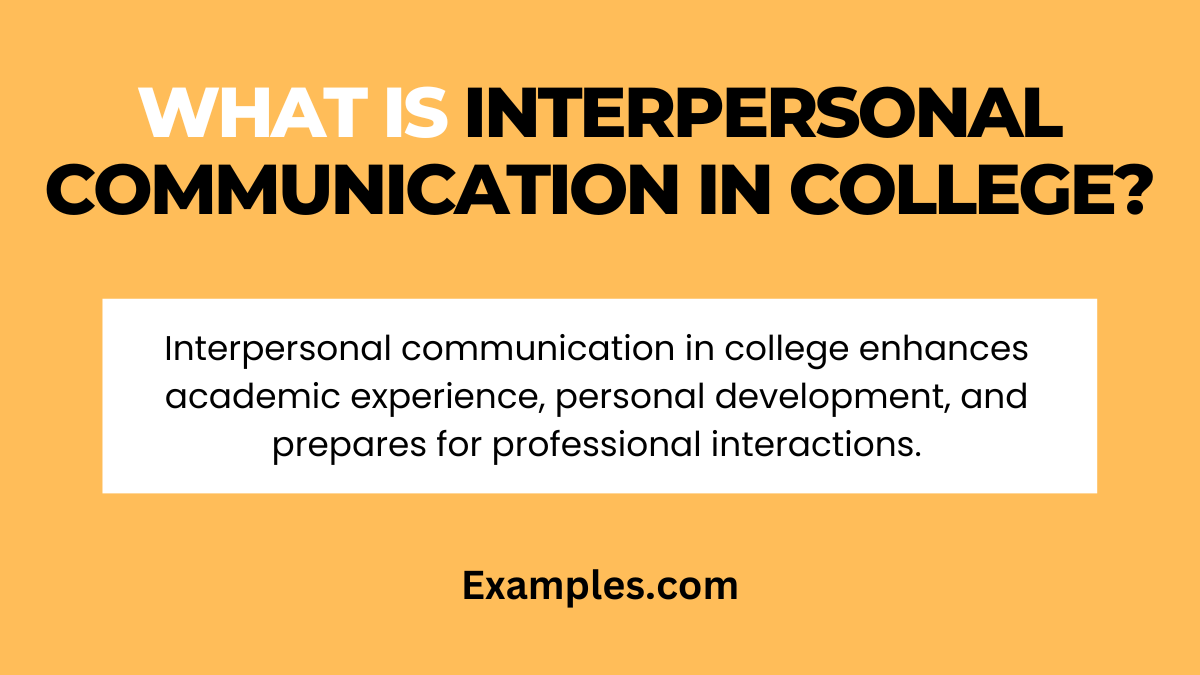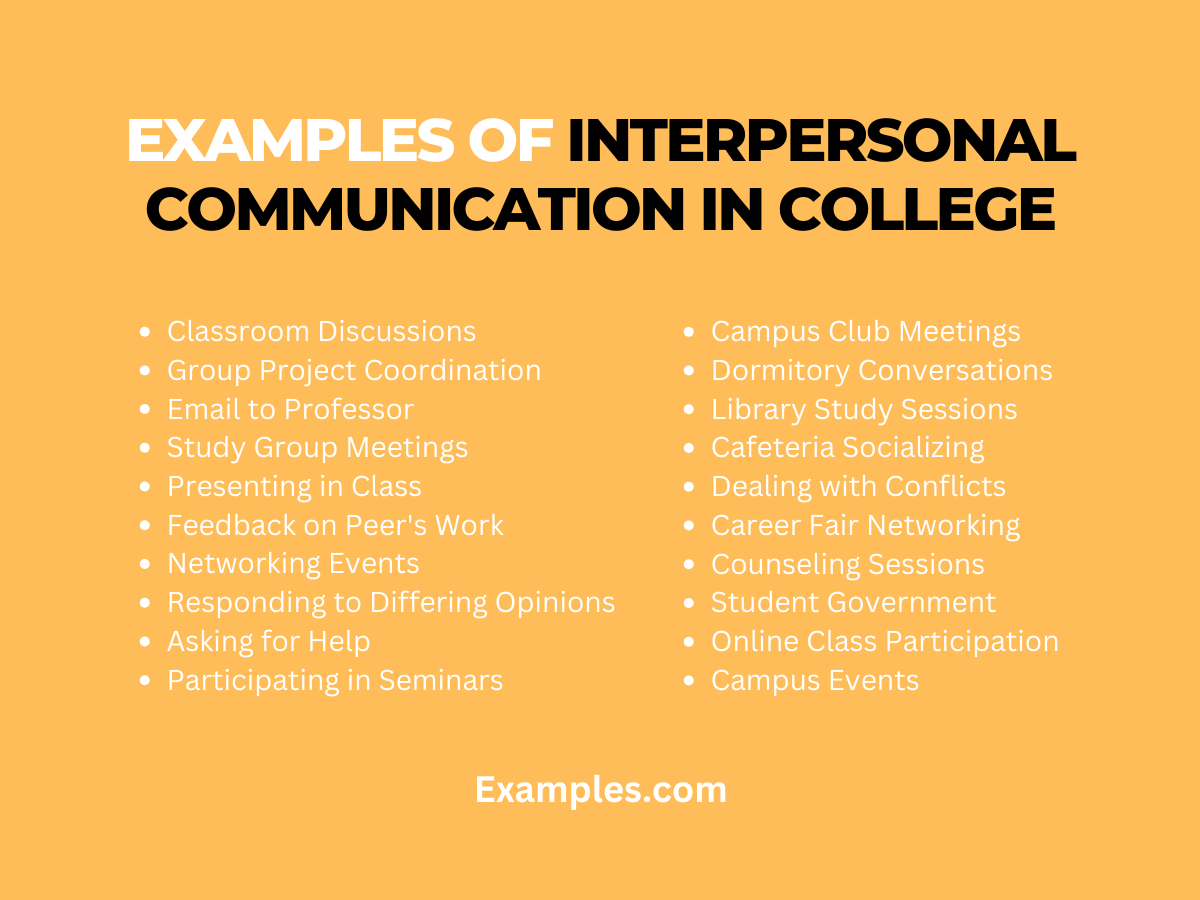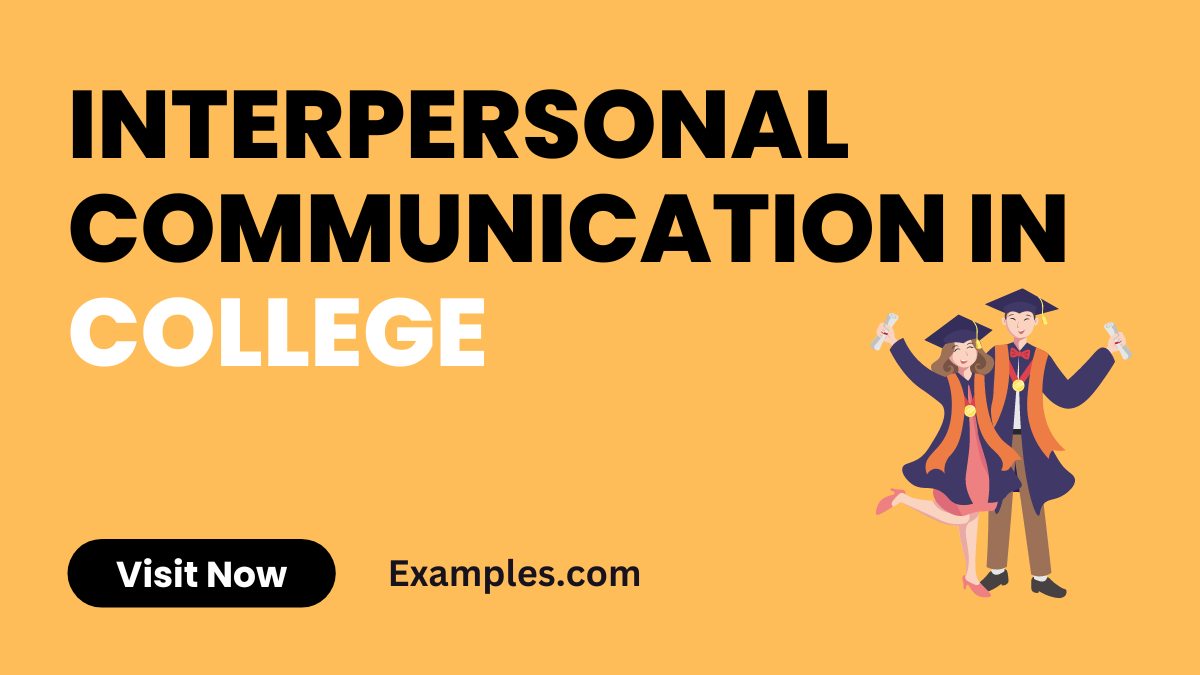19+ Interpersonal Communication in College Examples
Interpersonal communication in college is a dynamic and multifaceted aspect of the college experience. It encompasses various forms of interaction, with a strong emphasis on oral communication, vital for academic success and personal growth. This type of communication includes classroom discussions, group project coordination, and social interactions, all of which are crucial for navigating the diverse social landscape of college life. Effective interpersonal communication skills help students to engage actively in their education, build meaningful relationships, and prepare for future professional challenges.
What is Interpersonal Communication in College?

Interpersonal communication in college refers to the exchange of information, ideas, and emotions between individuals within a collegiate environment. This includes both verbal and non-verbal communication, such as discussions in class, group projects, social networking, and more. It plays a crucial role in enhancing students’ academic experience, fostering personal development, and preparing them for professional interactions. Effective interpersonal communication in college is key to building strong relationships, collaborating effectively, and thriving in an academic setting.
20 Examples of Interpersonal Communication in College

Interpersonal communication in college is an integral part of the educational experience, encompassing a wide range of interactions. These interactions, from verbal exchanges in the classroom to non-verbal cues in group projects, play a crucial role in shaping students’ academic and social life. Effective communication skills are essential for academic success, building relationships, and preparing for future professional environments. The following examples highlight various scenarios where interpersonal communication skills are applied in a college setting, showcasing their importance in everyday campus life.
- Classroom Discussions: “What’s everyone’s take on the author’s argument in this chapter?”
- Engaging in academic debates and sharing perspectives.
- Group Project Coordination: “Let’s divide the tasks based on our strengths.”
- Collaboratively working and communicating in teams.
- Email to Professor: “I’m unclear about the assignment requirements. Could we discuss this further?”
- Seeking clarification through respectful written communication.
- Study Group Meetings: “How about we meet twice a week to review lecture notes?”
- Organizing and planning group study sessions.
- Presenting in Class: “Today, I’ll be talking about the impacts of social media.”
- Delivering information clearly and confidently to an audience.
- Feedback on Peer’s Work: “Your essay was well-written. Maybe consider adding more examples in the third paragraph.”
- Offering constructive criticism to classmates.
- Networking Events: “I’m majoring in marketing. What’s your area of study?”
- Initiating conversations and building professional networks.
- Responding to Differing Opinions: “I see your point, but have you considered this perspective?”
- Respectfully addressing and discussing differing viewpoints.
- Asking for Help: “I’m struggling with this concept. Can anyone explain it differently?”
- Requesting assistance in an educational setting.
- Participating in Seminars: “That was an interesting lecture. Could you elaborate on the theory?”
- Engaging with speakers and enhancing learning.
- Campus Club Meetings: “Let’s plan our next event focused on environmental awareness.”
- Collaborating in extracurricular activities.
- Dormitory Conversations: “How was your day? Anything exciting happen in class?”
- Casual interactions with roommates or peers.
- Library Study Sessions: “This area is quiet. Perfect for focusing on our research.”
- Communicating preferences and needs in study environments.
- Cafeteria Socializing: “Mind if I join you for lunch? I’m new here.”
- Forming new social connections in communal spaces.
- Dealing with Conflicts: “I think we have a misunderstanding. Can we talk it out?”
- Addressing and resolving interpersonal conflicts.
- Career Fair Networking: “I’m interested in internships. What does your company offer?”
- Engaging with potential employers and gathering information.
- Counseling Sessions: “I’ve been feeling overwhelmed with my workload recently.”
- Expressing personal concerns in a supportive setting.
- Student Government: “As your representative, I’d like to address your concerns.”
- Speaking on behalf of others in leadership roles.
- Online Class Participation: “I agree with that point. It aligns with my research findings.”
- Contributing to discussions in virtual learning environments.
- Campus Events: “This workshop looks interesting. Want to check it out together?”
- Inviting peers to join in campus activities.
Types of Interpersonal Communication in College
Interpersonal communication in college is diverse, each type playing a crucial role in enhancing students’ academic and social experiences.
- Verbal Communication: Essential for classroom discussions and one-on-one interactions with professors.
- Non-Verbal Communication: Body language and facial expressions during presentations or group collaborations.
- Written Communication: Emails, essays, and group project reports.
- Digital Communication: Text messaging, social media interactions, and online learning platforms.
- Group Communication: Participating in study groups and team projects.
- Public Speaking: Delivering presentations or participating in college debates.
- Active Listening: Attentively engaging in lectures and peer conversations.
- Feedback Exchange: Providing and receiving feedback on academic assignments.
Benefits of Interpersonal Communication in College
Effective interpersonal communication in college offers several benefits crucial for both academic success and personal development.
- Enhances Learning: Facilitates better understanding and retention of classroom material.
- Builds Relationships: Fosters connections with peers and faculty.
- Improves Teamwork: Essential for group projects and collaborative learning.
- Develops Networking Skills: Crucial for building professional connections.
- Increases Cultural Awareness: Exposure to diverse perspectives enhances understanding.
- Boosts Confidence: Enhances self-esteem in public speaking and interactions.
- Aids Conflict Resolution: Effective in managing disagreements in group settings.
- Enhances Career Prospects: Develops communication skills valued in the workplace.
Theory of Interpersonal Communication in College
The theory of interpersonal communication in college combines various concepts to enhance students’ understanding and application of effective communication.
- Social Learning Theory: Emphasizes learning communication skills through observation.
- Cognitive Dissonance Theory: Addresses the discomfort in facing conflicting ideas during discussions.
- Uncertainty Reduction Theory: Focuses on reducing unknowns in new social and academic environments.
- Speech Act Theory: Analyzes how statements function as actions in academic settings.
- Politeness Theory: Guides respectful communication across diverse college communities.
- Social Penetration Theory: Describes the development of deeper relationships over time.
- Transactional Model of Communication: Views communication as a dynamic and interactive process.
- Relational Dialectics Theory: Addresses the dynamic and changing nature of relationships in college.
Why is Interpersonal Communication Important as a College Student?
Interpersonal communication is essential for college students for various reasons that contribute significantly to their overall success and well-being.
- Facilitates Learning: Promotes clearer understanding of academic content.
- Enhances Social Skills: Vital for forming lasting friendships and networks.
- Improves Academic Collaboration: Key for successful group projects and studies.
- Builds Professional Relationships: Helps in connecting with mentors and industry professionals.
- Supports Personal Growth: Encourages self-expression and confidence building.
- Aids in Conflict Management: Crucial for navigating challenges in group dynamics.
- Enhances Cultural Understanding: Fosters respect and inclusivity in diverse settings.
- Prepares for Career Success: Develops communication skills crucial for the professional world.
Mastering interpersonal communication in relationships is a journey of understanding, empathy, and skill development. This guide offers insights into navigating the complexities of communication, emphasizing the importance of clarity, active listening, and emotional intelligence. Whether in personal or professional relationships, these tips and strategies pave the way for stronger, more meaningful connections, enhancing both individual growth and relational harmony.



